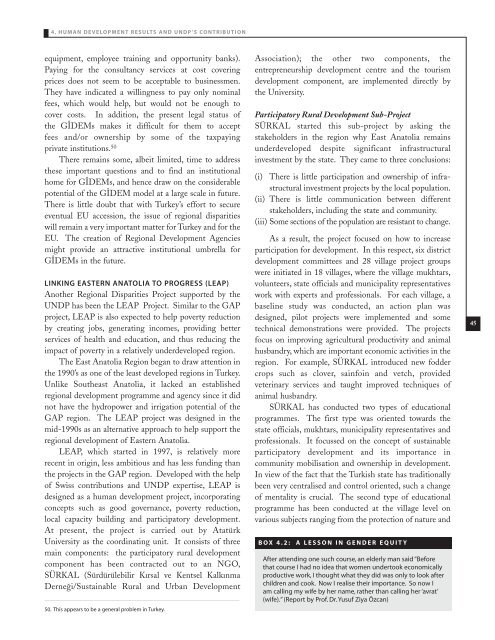Reports - United Nations Development Programme
Reports - United Nations Development Programme
Reports - United Nations Development Programme
You also want an ePaper? Increase the reach of your titles
YUMPU automatically turns print PDFs into web optimized ePapers that Google loves.
4. HUMAN DEVELOPMENT RESULTS AND UNDP’S CONTRIBUTION<br />
equipment, employee training and opportunity banks).<br />
Paying for the consultancy services at cost covering<br />
prices does not seem to be acceptable to businessmen.<br />
They have indicated a willingness to pay only nominal<br />
fees, which would help, but would not be enough to<br />
cover costs. In addition, the present legal status of<br />
the GI˚DEMs makes it difficult for them to accept<br />
fees and/or ownership by some of the taxpaying<br />
private institutions. 50<br />
There remains some, albeit limited, time to address<br />
these important questions and to find an institutional<br />
home for GI˚DEMs, and hence draw on the considerable<br />
potential of the GI˚DEM model at a large scale in future.<br />
There is little doubt that with Turkey’s effort to secure<br />
eventual EU accession, the issue of regional disparities<br />
will remain a very important matter for Turkey and for the<br />
EU. The creation of Regional <strong>Development</strong> Agencies<br />
might provide an attractive institutional umbrella for<br />
GI˚DEMs in the future.<br />
LINKING EASTERN ANATOLIA TO PROGRESS (LEAP)<br />
Another Regional Disparities Project supported by the<br />
UNDP has been the LEAP Project. Similar to the GAP<br />
project, LEAP is also expected to help poverty reduction<br />
by creating jobs, generating incomes, providing better<br />
services of health and education, and thus reducing the<br />
impact of poverty in a relatively underdeveloped region.<br />
The East Anatolia Region began to draw attention in<br />
the 1990’s as one of the least developed regions in Turkey.<br />
Unlike Southeast Anatolia, it lacked an established<br />
regional development programme and agency since it did<br />
not have the hydropower and irrigation potential of the<br />
GAP region. The LEAP project was designed in the<br />
mid-1990s as an alternative approach to help support the<br />
regional development of Eastern Anatolia.<br />
LEAP, which started in 1997, is relatively more<br />
recent in origin, less ambitious and has less funding than<br />
the projects in the GAP region. Developed with the help<br />
of Swiss contributions and UNDP expertise, LEAP is<br />
designed as a human development project, incorporating<br />
concepts such as good governance, poverty reduction,<br />
local capacity building and participatory development.<br />
At present, the project is carried out by Atatürk<br />
University as the coordinating unit. It consists of three<br />
main components: the participatory rural development<br />
component has been contracted out to an NGO,<br />
SÜRKAL (Sürdürülebilir Kırsal ve Kentsel Kalkınma<br />
Derneği/Sustainable Rural and Urban <strong>Development</strong><br />
————————————————————————————————————<br />
50. This appears to be a general problem in Turkey.<br />
Association); the other two components, the<br />
entrepreneurship development centre and the tourism<br />
development component, are implemented directly by<br />
the University.<br />
Participatory Rural <strong>Development</strong> Sub-Project<br />
SÜRKAL started this sub-project by asking the<br />
stakeholders in the region why East Anatolia remains<br />
underdeveloped despite significant infrastructural<br />
investment by the state. They came to three conclusions:<br />
(i) There is little participation and ownership of infrastructural<br />
investment projects by the local population.<br />
(ii) There is little communication between different<br />
stakeholders, including the state and community.<br />
(iii) Some sections of the population are resistant to change.<br />
As a result, the project focused on how to increase<br />
participation for development. In this respect, six district<br />
development committees and 28 village project groups<br />
were initiated in 18 villages, where the village mukhtars,<br />
volunteers, state officials and municipality representatives<br />
work with experts and professionals. For each village, a<br />
baseline study was conducted, an action plan was<br />
designed, pilot projects were implemented and some<br />
technical demonstrations were provided. The projects<br />
focus on improving agricultural productivity and animal<br />
husbandry, which are important economic activities in the<br />
region. For example, SÜRKAL introduced new fodder<br />
crops such as clover, sainfoin and vetch, provided<br />
veterinary services and taught improved techniques of<br />
animal husbandry.<br />
SÜRKAL has conducted two types of educational<br />
programmes. The first type was oriented towards the<br />
state officials, mukhtars, municipality representatives and<br />
professionals. It focussed on the concept of sustainable<br />
participatory development and its importance in<br />
community mobilisation and ownership in development.<br />
In view of the fact that the Turkish state has traditionally<br />
been very centralised and control oriented, such a change<br />
of mentality is crucial. The second type of educational<br />
programme has been conducted at the village level on<br />
various subjects ranging from the protection of nature and<br />
BOX 4.2:<br />
A LESSON IN GENDER EQUITY<br />
After attending one such course, an elderly man said “Before<br />
that course I had no idea that women undertook economically<br />
productive work, I thought what they did was only to look after<br />
children and cook. Now I realise their importance. So now I<br />
am calling my wife by her name, rather than calling her ‘avrat’<br />
(wife).” (Report by Prof. Dr. Yusuf Ziya Özcan)<br />
45

















